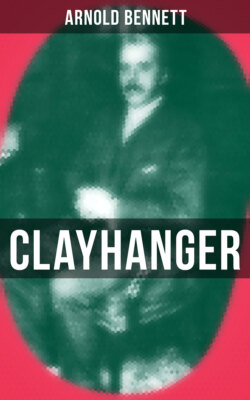Читать книгу CLAYHANGER - Arnold Bennett - Страница 80
На сайте Литреса книга снята с продажи.
Four.
ОглавлениеWhen they had crossed the windy space of Saint Luke’s Square and reached the top of the Sytch Bank, Mr Orgreave stopped an instant in front of the Sytch Pottery, and pointed to a large window at the south end that was in process of being boarded up.
“At last!” he murmured with disgust. Then he said: “That’s the most beautiful window in Bursley, and perhaps in the Five Towns; and you see what’s happening to it.”
Edwin had never heard the word ‘beautiful’ uttered in quite that tone, except by women, such as Auntie Hamps, about a baby or a valentine or a sermon. But Mr Orgreave was not a woman; he was a man of the world, he was almost the man of the world; and the subject of his adjective was a window!
“Why are they boarding it up, Mr Orgreave?” Edwin asked.
“Oh! Ancient lights! Ancient lights!”
Edwin began to snigger. He thought for an instant that Mr Orgreave was being jocular over his head, for he could only connect the phrase ‘ancient lights’ with the meaner organs of a dead animal, exposed, for example, in tripe shops. However, he saw his ineptitude almost simultaneously with the commission of it, and smothered the snigger in becoming gravity. It was clear that he had something to learn in the phraseology employed by architects.
“I should think,” said Mr Orgreave, “I should think they’ve been at law about that window for thirty years, if not more. Well, it’s over now, seemingly.” He gazed at the disappearing window. “What a shame!”
“It is,” said Edwin politely.
Mr Orgreave crossed the road and then stood still to gaze at the facade of the Sytch Pottery. It was a long two-storey building, purest Georgian, of red brick with very elaborate stone facings which contrasted admirably with the austere simplicity of the walls. The porch was lofty, with a majestic flight of steps narrowing to the doors. The ironwork of the basement railings was unusually rich and impressive.
“Ever seen another pot-works like that?” demanded Mr Orgreave, enthusiastically musing.
“No,” said Edwin. Now that the question was put to him, he never had seen another pot-works like that.
“There are one or two pretty fine works in the Five Towns,” said Mr Orgreave. “But there’s nothing elsewhere to touch this. I nearly always stop and look at it if I’m passing. Just look at the pointing! The pointing alone—”
Edwin had to readjust his ideas. It had never occurred to him to search for anything fine in Bursley. The fact was, he had never opened his eyes at Bursley. Dozens of times he must have passed the Sytch Pottery, and yet not noticed, not suspected, that it differed from any other pot-works: he who dreamed of being an architect!
“You don’t think much of it?” said Mr Orgreave, moving on. “People don’t.”
“Oh yes! I do!” Edwin protested, and with such an air of eager sincerity that Mr Orgreave turned to glance at him. And in truth he did think that the Sytch Pottery was beautiful. He never would have thought so but for the accident of the walk with Mr Orgreave; he might have spent his whole life in the town, and never troubled himself a moment about the Sytch Pottery. Nevertheless he now, by an act of sheer faith, suddenly, miraculously and genuinely regarded it as an exquisitely beautiful edifice, on a plane with the edifices of the capitals of Europe, and as a feast for discerning eyes. “I like architecture very much,” he added. And this too was said with such feverish conviction that Mr Orgreave was quite moved.
“I must show you my new Sytch Chapel,” said Mr Orgreave gaily.
“Oh! I should like you to show it me,” said Edwin.
But he was exceedingly perturbed by misgivings. Here was he wanting to be an architect, and he had never observed the Sytch Pottery! Surely that was an absolute proof that he had no vocation for architecture! And yet now he did most passionately admire the Sytch Pottery. And he was proud to be sharing the admiration of the fine, joyous, superior, luxurious, companionable man, Mr Orgreave.
